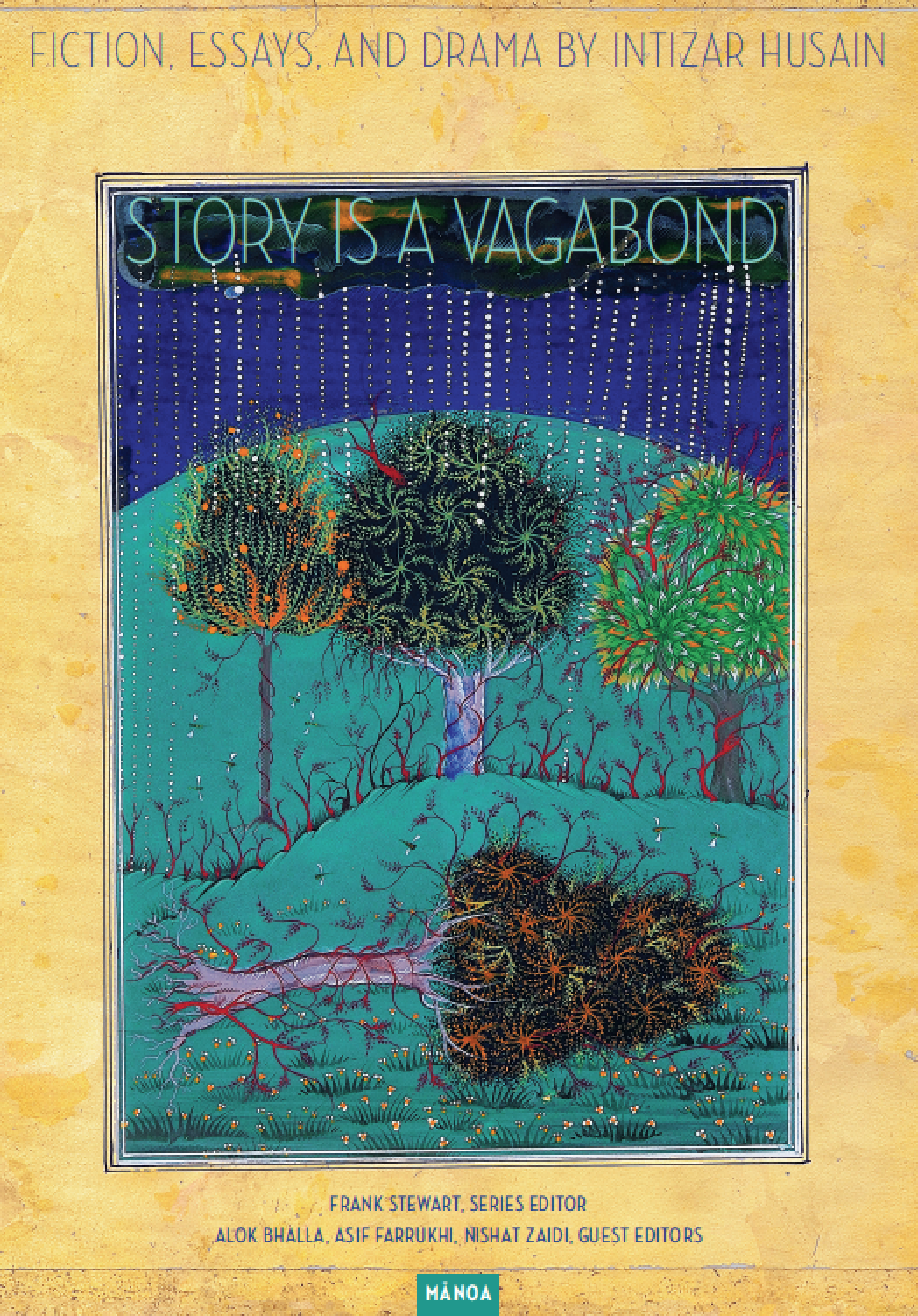Presented by Manoa: A Pacific Journal of International Writing
Story Is A Vagabond: Fiction, Essays, and Drama by Intizar Husain
Guest Editors: Alok Bhalla, Asif Farrukhi, and Nishat Zaidi
Intizar Husain has been called the greatest living writer in the Urdu language, a living legend, and Pakistan’s preeminent chronicler of change. His voice of compassion and insight is much needed, not only in his troubled homeland but wherever English-speaking readers know about Pakistan only through the mass media.
Born in 1925 in Dibai, India, Husain migrated to Pakistan in 1947. His epic novel of the Partition, Basti, was short-listed for the 2013 Man Booker International Prize and was recently republished as a New York Review of Books Classics Original. His honors include the 2014 French Officier de L’Ordre des Arts et des Lettres and the Lifetime Achievement Award presented at the 2012 Lahore Literary Festival.
This issue features paintings by contemporary Pakistani artist Imran Qureshi.

Introduction
Alok Bhalla, vii
(excerpt from Introduction)
Before I met Intizar Husain in Lahore, I was told that he was a simple man of gentle wit and great learning who was always willing to travel miles to pay homage to an old banyan tree or an ancient village well. Since I was familiar with his stories, I recognised that his search for a many-rooted banyan tree or a well resonating with the uncanny was not a strange eccentricity. In his stories, a well with a parapet or a banyan tree with its spreading shade were sites of a soul-saving pilgrimage his wanderers felt compelled to make to places of continuous replenishment and generous shelter. The well, in his fictional mythos, was connate with the sacred foundations of a human settlement, and the banyan was a privileged village-centre under whose shade all claims about the innate differences between the sage, the beast, the parrot, and the jinn were inadmissible and unsustainable. The well and the banyan were, for him, the abiding and organising symbols of an older cultural faith of the subcontinent, which assumed that it was always possible for different communities to create a life of “complex and pluralistic wholeness” (the phrase is Charles Taylor’s)—a faith lost in the melodramas of grievance and revenge enacted during the Partition and the religious enthusiasm of mobs for gods, paradise, and martyrs.
Fiction
An Unwritten Epic
Intizar Husain, Alok Bhalla, and Vishwamitter Adil, 1
Qayyuma’s Shop
Intizar Husain and Moazzam Sheikh, 17
A Stranded Railroad Car
Intizar Husain and Muhammad Umar Memon, 31
Complete Knowledge
Intizar Husain, Alok Bhalla, and Vishwamitter Adil, 41
The City of Sorrow
Intizar Husain, Alok Bhalla, and Vishwamitter Adil, 49
The Lost Ones
Intizar Husain and Muhammad Umar Memon, 61
The Prisoner(s)
Intizar Husain and C. M. Naim, 73
Clouds
Intizar Husain and M. Asaduddin, 81
Leaves
Intizar Husain, Alok Bhalla, and Vishwamitter Adil, 84
The Boat
Intizar Husain, Alok Bhalla, and Vishwamitter Adil, 95
A Chronicle of the Peacocks
Intizar Husain, Alok Bhalla, and Vishwamitter Adil, 105
The Jungle of the Gonds
Intizar Husain, Alok Bhalla, and Vishwamitter Adil, 113
The Death of Sheherzad
Intizar Husain and Rakhshanda Jalil, 123
Toward His Fire
Intizar Husain and Muhammad Umar Memon, 128
Comrades
pp. 137-145
Intizar Husain and Richard R. Smith, 137
The Shadow
Intizar Husain and Muhammad Umar Memon, 146
Drama
The Deluge: A Play
Intizar Husain, Alok Bhalla, and Nishat Zaidi, 156
Essays
Many Dreams Later!
Intizar Husain, Nishat Zaidi, and Alok Bhalla, 189
Between Me and the Story
Intizar Husain and Rakhshanda Jalil, 196
Stage Drama with Reference to Some Personal Experiences
Intizar Husain and Asif Farrukhi, 202
Vanishing Tradition
Intizar Husain, 207
In the Maze of Brindaban
Intizar Husain, Nishat Zaidi, and Alok Bhalla, 213
Literature and Love
Intizar Husain and Frances W. Pritchett, 220
The Blind Age
Intizar Husain and Asif Farrukhi, 226
Reason and Purpose of the Jataka Stories
Intizar Husain, Nisaht Zaidi, and Alok Bhalla 230
The Last Candle
Intizar Husain and M. Asaduddin, 233
Vikram, the Vampire, and the Story
Intizar Husain and Frances W. Pritchett, 241
Afterword
In Conversation with Intizar Husain: Some Remembered, Some Imagined
Alok Bhalla and Intizar Husain, 245
Glossary of Names and Terms, 257
About the Artist, 261
Permissions, 262
List of Illustrations
Imran Qureshi, ii-206






